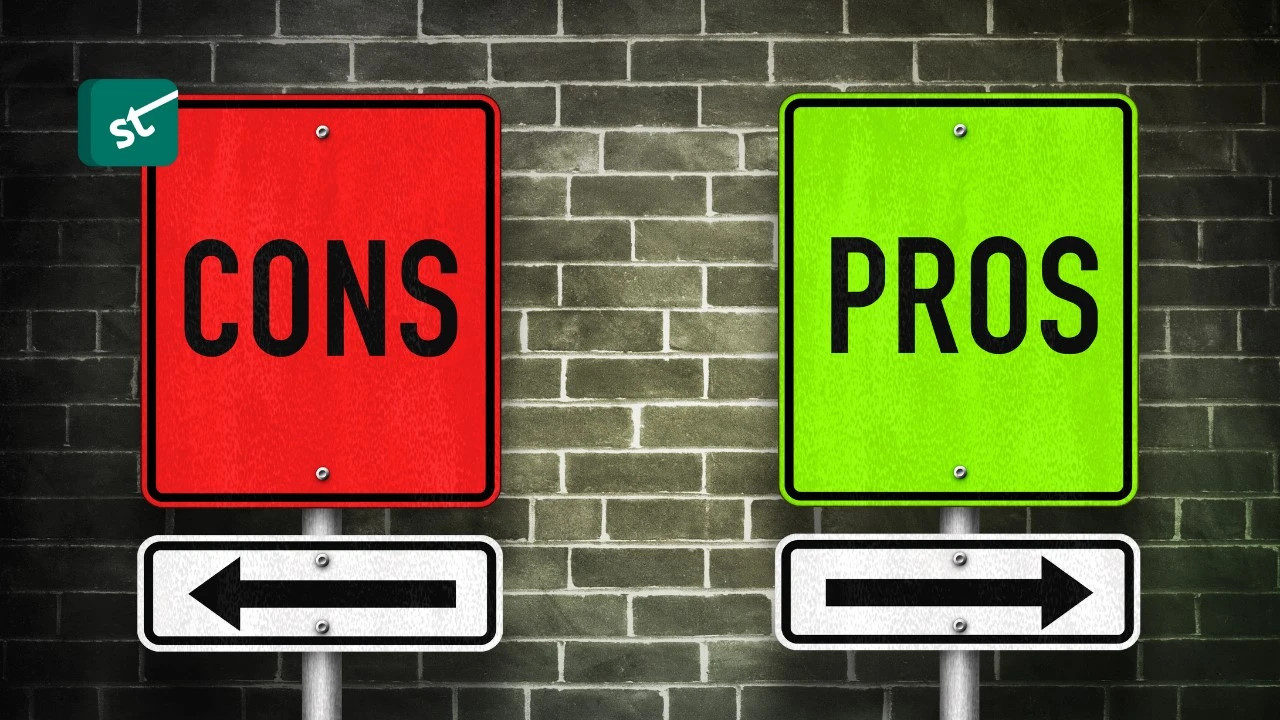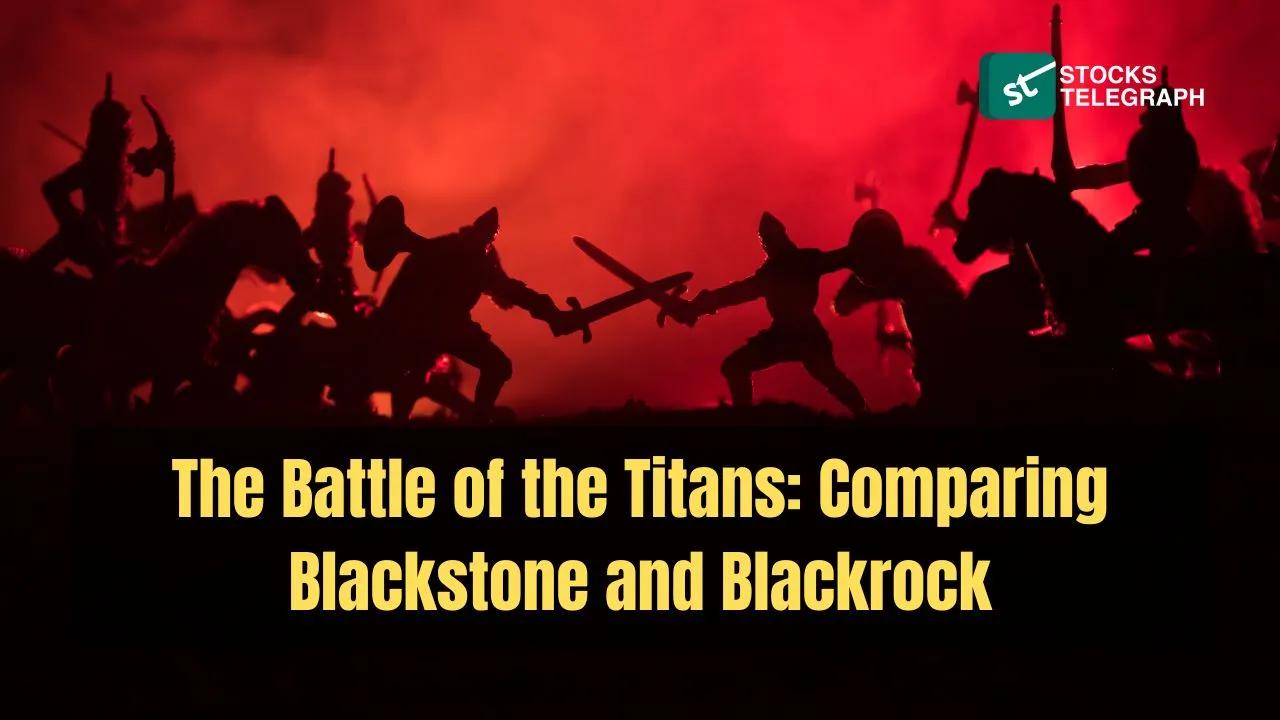In the world of global investment management, the rivalry between BlackRock vs Blackstone stands out as undisputed giants.
With extensive assets under management and significant influence on global financial markets, these two investment firms have shaped the landscape of modern finance.
Blackstone and BlackRock differ in their expertise. Blackstone specializes in private equity and alternative investments, while BlackRock focuses on asset management and ETFs.
In this article, we conduct an in-depth analysis of these investment powerhouses, exploring their origins, investment strategies, leadership, and impact on the financial landscape.
Through a comparative lens, we highlight the similarities and differences between BlackRock vs Blackstone, examining their scale, differences, and unique approaches to managing assets.
Join us as we uncover a fascinating comparison between Blackstone vs BlackRock and uncover the nuances of these industry giants.
Main Difference Between BlackRock and Blackstone
The major difference between BlackRock and Blackstone is their strategic approach to investing. BlackRock primarily focuses on public markets and passive investment strategies, while Blackstone specializes in private markets and active management.
BlackRock’s offerings are more accessible to retail investors, while Blackstone’s products and services are primarily targeted at institutional investors and high-net-worth individuals.
What is BlackRock?
Before we begin our detailed comparison of BlackRock and Blackstone, let’s briefly introduce each investment firm. BlackRock Inc. (NYSE: BLK) is the first name we assess.
BlackRock is a leading American global investment manager that serves institutional, intermediary, and individual investors across a wide range of sectors and geographies.
It was founded in 1988 by Larry Fink, who is currently the chairman and CEO of the enterprise, along with Robert S. Kapito, Susan Wagner, and several others.
With a diverse offering of equity, fixed income, and balanced portfolios, as well as balanced funds, ETFs, and alternative investment vehicles, BlackRock caters to a broad spectrum of client needs.
The firm’s investment approach combines fundamental and quantitative analysis, employing both bottom-up and top-down strategies.
BlackRock’s global footprint, scale advantage, and expertise in risk management and advisory services have made it a trusted choice for investors.
What is Blackstone?
Now, we shift our attention to Blackstone Inc. (NYSE: BX), another prominent New York-based alternative asset management firm that specializes in a diverse range of investment strategies. It was in 1985 that Blackstone came into being, and was founded by Peter G. Peterson and Stephen A. Schwarzman.
Blackstone specializes in a wide range of investment strategies including real estate, private equity, hedge fund solutions, credit, and multi-asset class investments.
With a global presence, Blackstone invests in early-stage companies and pursues various transaction types such as large buyouts, special situations, distressed mortgage loans, and growth equity projects.
The firm’s real estate segment focuses on opportunistic and core+ investments, while its private equity business engages in transactions worldwide.
Blackstone also manages hedge funds and credit investments, including loans and securities of non-investment grade companies.
Founded in 1985, Blackstone is a big Wall Street name and operates offices across Asia, Europe, and North America.
Blackstone Group Stock Analysis
Blackstone Group’s stock currently trades at a price of 89.00. The market has shown limited interest in recent minor price fluctuations, which may raise concerns among investors.

Despite this indifference, it is important to examine the implications of these fluctuations on the company’s overall performance.
-
Executive Contributions
During the month of May 2023, Blackstone Group’s executives did not introduce any significant value to investors.
This lack of value addition might be perceived as a potential risk for those considering investing in the company. Investors should closely monitor future executive decisions and their impact on the company’s growth potential.
-
Volatility and Risk Mitigation
Blackstone Group offers a potential avenue for investors to diversify their portfolios and mitigate risk. By including Blackstone Group shares, investors can hedge against inherited risks associated with high-volatility market scenarios.
Currently, the stock’s standard deviation of daily returns over a 90-day investment horizon is 2.47, which aligns with the ongoing market swings in May 2023 and company-specific events affecting Blackstone.
-
In-Depth Analysis
To conduct a thorough Blackstone Group stock analysis, investors should consider additional factors beyond price fluctuations.
This includes evaluating the company’s financial performance, industry trends, competitive positioning, and strategic initiatives.
Keeping a close eye on quarterly earnings reports, revenue growth, and expense management will provide valuable insights into the company’s long-term prospects.
Is Blackrock or Blackstone Bigger?
The question in the financial landscape arises: Is Blackrock or Blackstone Bigger? In terms of sheer size, BlackRock claims the crown, with its extensive resources, broader global reach, and larger total assets.”
Both Blackstone and BlackRock have market capitalizations that are approximately $100 billion, as of April 2023.
While the former is considered the world’s largest private equity firm, the latter holds the title of the world’s largest asset manager.
BlackRock’s top three holdings are Apple (NASDAQ: AAPL), Alphabet Inc Class A (NASDAQ: GOOGL), Microsoft (NASDAQ: MSFT), NVIDIA Corporation (NASDAQ: NVDA), and Amazon (NASDAQ: AMZN).
The comparison of “BlackRock total assets” and “Blackstone’s total AUM” reveals a significant divergence. BlackRock surpasses Blackstone by a substantial margin, with an impressive $10 trillion in total assets under management.
On the other hand, Blackstone lags behind with a comparatively lower total AUM of $975 billion. This stark contrast underscores the vast disparity in the scale of assets held by these two financial giants.
It must be noted that Blackstone’s $975 billion AUM includes at least 250 portfolio companies and 12,000 real estate assets.
For anyone wondering exactly which companies does Blackstone own, the group owns top-tier names such as Hilton Worldwide, Southern Cross Healthcare, Motel 6, and many others.
Alternatively, BlackRock’s portfolio consists of stakes in almost 5000 companies, with the largest investments including Apple and Microsoft.
Overall, both Blackstone and Blackrock are gigantic financial establishments that hold dominant positions in the investment industry. However, based on comparable metrics, BlackRock stands as the larger of the two titans.
Are Blackstone and BlackRock Related?
Despite both being two distinct giant players in the financial landscape, and fierce competitors of one another, Blackstone and BlackRock are related in an interesting manner.

This relationship comes as a result of a shared history going back to the 1980s.
When Larry Fink and his co-founders started their bond analytics and capital risk management firm in 1988, they were financed by Peter Peterson and Steve Schwarzman. Under the arrangement, the firm was named Blackstone Financial Management.
Following its initial seeding, the firm worked towards getting off the floor in the asset management business, and in just 6 years saw its AUM figure explode to over $50 billion. By 1994, disagreements between Larry Fink and Steve Schwarzman continued to grow.
In particular, Fink really wanted to share equity with new recruits, in a bid to attract the best talent from the banking industry. Schwarzman was opposed to this view, not wanting to compromise an inch on Blackstone’s overall stake.
Eventually, the two split, and Fink was permitted to use the brand name BlackRock, moving forward. The rest is history, and both entities have made their mark and established themselves as giants in the investment space.
Despite the shared history and initial connection between BlackRock and Blackstone, they are now separate and distinct financial firms with their own operations, strategies, and areas of expertise.
While they may have had a common origin, they have evolved into separate entities with independent operations and identities in the financial services industry. Today, the Blackstone vs BlackRock rivalry stands among the most intense in the industry.
Key Differences Between BlackRock vs Blackstone
We now get to the crux of our comparison between Blackstone vs BlackRock and highlight the core differences between each of them. These are detailed below, as follows:
-
Strategic Approach
The fundamental difference in the BlackRock vs Blackstone comparison lies in their strategic approach. The difference in investment strategy ultimately is what resulted in the split-off between the two firms.
After separating from its parent company, BlackRock took on a more traditional route to asset management and has grown by focusing on conventional market investments such as mutual funds, ETFs, and fixed-income assets like negotiable CDs.
-
Size of Business
Despite their shared history on a level playing field, there is a clear distinction between the two firms, in terms of their sheer size. This is a fundamental part of the BlackRock vs Blackstone comparison.
While Blackstone, with its AUM figure of $975 billion is considered an enormous part of the global investment space, it simply does not compare to the extent of BlackRock’s business size, with AUM exceeding $10 trillion.
-
Clientele
Another crucial difference between Blackstone vs BlackRock is the type of clients each caters to.
While Blackstone has opted to maintain a high degree of exclusivity, catering only to institutional investors and high net worth, BlackRock offers a high degree of accessibility, allowing all types of investors.
BlackRock allows for such an open approach through its diverse offerings, such as income and growth funds. In large part, this explains the successful growth of BlackRock and its overtaking of its former parent company.
-
Scope of Offerings
BlackRock has a broader scope of offerings for investors to choose from. These include a wide range of asset classes, including equities, fixed income, real estate, alternatives, and multi-asset strategies.
Blackstone, on the other hand, has a narrower focus on alternative investments, such as private equity, real estate, hedge funds, credit, and other alternative asset classes.
This distinction is evident in the fact that BlackRock allows investors to park their funds in both open and closed-end funds, whereas Blackstone only offers the option of investing in closed-end funds.
-
Investment Horizon
BlackRock typically takes a long-term investment horizon, as its passive investment strategies are designed to provide returns over the long term, and its investment decisions are based on quantitative models and market trends.
Blackstone, being an alternative asset manager, may have shorter investment horizons, with investment strategies that may involve shorter holding periods, depending on the specific investment opportunities and market conditions.
-
BlackRock: Index Fund Pioneers
BlackRock has gained recognition as a pioneer in the index fund industry. The company has been at the forefront of developing and popularizing exchange-traded funds (ETFs) and passive investment strategies.
With a strong emphasis on low-cost investing, BlackRock caters to retail investors who seek broad market exposure and long-term growth.
-
Blackstone: Private Equity Leadership
On the other hand, Blackstone has established itself as a leader in the private equity sector. The company specializes in acquiring and managing private companies, aiming to generate significant returns for its investors.
Blackstone’s expertise lies in identifying undervalued assets and employing active management strategies to enhance their value.
-
Focus on Retail Investors vs. Private Equity
While both BlackRock and Blackstone manage investments, their target audiences differ significantly. BlackRock primarily focuses on retail investors, providing them with accessible investment options and empowering them to participate in the market.
In contrast, Blackstone’s primary client base consists of institutional investors and high-net-worth individuals seeking exposure to private equity and alternative investments.
-
Real Estate Expertise vs. Technology and Innovation
Blackstone has a notable specialization in real estate investments. The company leverages its expertise to identify attractive real estate opportunities, ranging from commercial properties to residential developments.
BlackRock, on the other hand, distinguishes itself through its emphasis on technology and innovation. The company utilizes advanced technological solutions to drive efficiency and provide data-driven insights for its investment strategies.
-
Private Wealth Management vs. Scale and Accessibility
Blackstone extends its services to private wealth management, catering to the unique needs of affluent individuals and families. Through customized investment strategies and comprehensive financial planning, Blackstone helps its clients preserve and grow their wealth.
BlackRock, on the other hand, prioritizes scale and accessibility, aiming to provide investment solutions that are easily accessible to a broad range of investors, regardless of their wealth status.
-
Philanthropy and Social Impact
Blackstone demonstrates a commitment to philanthropy and social impact by actively engaging in initiatives that promote positive change. The company works on projects that address societal challenges and seeks to create sustainable, long-term solutions.
While BlackRock also engages in socially responsible investing, its primary focus remains on delivering strong financial results for its clients.
-
Size & Scale of Operations
Both BlackRock and Blackstone operate on a massive scale, managing substantial amounts of assets. However, BlackRock currently boasts a larger balance sheet, making it the world’s largest asset management firm.
This scale allows BlackRock to leverage its resources and deliver a wide range of investment solutions to its clients.
-
Fund Solutions Offered
In terms of fund solutions, BlackRock and Blackstone differ in their offerings. BlackRock is renowned for its wide array of index funds and ETFs, providing investors with options that cover various asset classes and investment strategies.
Blackstone, on the other hand, focuses on private equity funds and alternative investment vehicles, offering opportunities for investors seeking higher risk-adjusted returns.
BlackRock vs Blackstone Similarities
When comparing BlackRock and Blackstone, two prominent names in the investment management industry, it becomes apparent that they share certain similarities despite their distinct approaches.

Here are some key areas where these financial giants align:
-
Global Influence
Both BlackRock and Blackstone hold considerable influence on a global scale. They have established themselves as major players in the investment management sector and have a significant impact on financial markets worldwide.
-
Reputation and Expertise
Both firms have earned a reputation for their expertise in their respective areas of focus. BlackRock is renowned for its proficiency in index funds and exchange-traded funds (ETFs), while Blackstone has established itself as a leader in private equity investments.
-
Focus on Asset Management
BlackRock and Blackstone are primarily engaged in asset management activities. While BlackRock emphasizes a broader range of asset classes, including equities, fixed income, and real estate, Blackstone focuses on alternative investments such as private equity, hedge funds, and real estate.
-
Large-scale Operations
These firms operate on a massive scale, managing substantial amounts of assets for their clients. BlackRock, with its AUM exceeding $10 trillion, holds the distinction of being the world’s largest asset management firm, while Blackstone manages assets worth billions of dollars.
-
Clientele Diversity
While there are differences in their target audiences, both firms cater to institutional investors, albeit to varying degrees. BlackRock also offers investment options that are accessible to retail investors, while Blackstone primarily serves institutional investors and high-net-worth individuals.
-
Emphasis on Innovation
Both BlackRock and Blackstone recognize the importance of technology and innovation in their operations. They leverage advanced technological solutions to enhance efficiency, data-driven insights, and investment strategies.
Despite these similarities, it’s crucial to understand that BlackRock and Blackstone have distinctive strategies, focuses, and business models that set them apart from each other.
BlackRock vs Blackstone Pros and Cons
When assessing the pros and cons of BlackRock and Blackstone, it’s important to consider the strengths and weaknesses associated with each firm. Here’s a closer look at what they offer:

BlackRock Pros
-
Diverse Investment Options
BlackRock provides a wide range of investment options, including index funds, ETFs, equities, fixed income, real estate, and multi-asset strategies. This allows investors to tailor their portfolios to their specific needs.
-
Retail Investor Focus
BlackRock’s emphasis on accessibility makes it appealing to retail investors. They offer investment solutions that are easily accessible to a broad range of individuals, empowering them to participate in the market.
-
Index Fund Pioneers
As a pioneer in the index fund industry, BlackRock has played a significant role in popularizing passive investment strategies. Their low-cost approach attracts investors seeking broad market exposure and long-term growth.
BlackRock Cons
-
Size and Scale
While BlackRock’s vast size is a testament to its success, managing such a massive amount of assets can pose challenges. It requires a robust infrastructure and a complex operational framework, which may lead to potential inefficiencies.
-
Potential Lack of Exclusivity
BlackRock’s focus on accessibility might result in a perception of diminished exclusivity compared to firms that primarily serve institutional investors and high-net-worth individuals.
Blackstone Pros
-
Private Equity Leadership
Blackstone’s expertise lies in private equity investments. They excel at identifying undervalued assets and employing active management strategies to enhance their value, potentially providing significant returns for investors.
-
Focus on Institutional Investors
Blackstone’s exclusivity in catering to institutional investors allows them to tailor their offerings to the specific needs and objectives of this sophisticated clientele.
Blackstone Cons
-
Limited Retail Investor Access
Blackstone’s primary focus on institutional investors and high-net-worth individuals means that retail investors may have limited access to their investment opportunities.
-
Narrower Scope of Offerings
While Blackstone excels in private equity investments, their offerings are more limited compared to BlackRock’s diverse asset class options. This narrower focus may not align with the investment preferences of certain investors.
Pair Trading with BlackRock and Blackstone
Pair trading involves creating a strategy that simultaneously trades two correlated instruments, aiming to profit from the relative performance of the pair.
While BlackRock and Blackstone are distinct entities, they can be potentially utilized in a pair trading strategy due to their relationship within the investment management industry.
By combining these two firms in a pair trading approach, investors may benefit from their divergent strategies and market positions. Here’s how it could work:
-
Strategy Diversification
Pairing BlackRock and Blackstone in a trading strategy allows investors to diversify their exposure across traditional market investments (BlackRock) and alternative investments (Blackstone). This diversification can help mitigate risk and enhance potential returns.
-
Market Timing Opportunities
As BlackRock focuses on longer-term investment horizons and Blackstone may have shorter investment horizons, the pair trading strategy can take advantage of market timing opportunities.
Investors can capitalize on the relative performance of the two firms based on specific investment opportunities and market conditions.
-
Risk Management
Pair trading can provide a risk management mechanism by hedging positions against each other. If one firm’s performance is affected by market fluctuations, the other firm’s performance may counterbalance it, potentially reducing overall portfolio risk. This is a great way to manage your investments while minimizing risk.
Other Complementary Tools
While BlackRock and Blackstone are prominent players in the investment management industry, there are several other complementary tools and resources available to investors.
These tools can assist in investment decision-making, portfolio management, and market analysis. Here are a few examples:
-
Financial News and Research Platforms
Platforms such as Bloomberg, Reuters, Stocks Telegraph, and financial news websites provide real-time market updates, economic indicators, company news, and in-depth research reports.
These resources help investors stay informed and make well-informed investment decisions based on thorough research.
-
Portfolio Management Software
Portfolio management software allows investors to track and analyze their investment portfolios, monitor performance, analyze risk, and generate reports. These tools offer valuable insights and help investors optimize their portfolios.
-
Technical Analysis Tools
Technical analysis tools, such as charting software and indicators, assist investors in analyzing historical price patterns, identifying trends, and making predictions based on price movements.
They provide visual representations of market data, helping investors make informed trading decisions.
-
Fundamental Analysis Resources
Fundamental analysis tools and databases, such as financial statements, company filings, and industry reports, offer insights into a company’s financial health, management effectiveness, competitive landscape, and overall industry trends.
These resources aid investors in assessing the intrinsic value of investments.
-
Risk Management Tools
Risk management tools, including risk assessment models, portfolio optimization software, and stress testing tools, help investors identify and manage risks associated with their portfolios.
These tools assist in creating well-diversified portfolios and implementing risk mitigation strategies.
Which is a Better Investment?
We now make it to the ultimate conclusion of the comparative analysis conducted in the prior sections and assess which of the two companies is actually better from an investment standpoint.
As has already been pointed out, there are some clear distinctions between the two companies, and since the split-off in the 1990s, BlackRock has grown at an incredible pace, with its present size ten-fold that of Blackstone Inc.
Blackrock’s explosive growth since its inception indicates that its strategic approach and traditional investment style are indeed remarkably successful, in terms of delivering value to its shareholders.
Above all, it has managed to attain such explosive growth over the years, as a result of its diverse and inclusive investment offerings.
Overall, the following key points summarize BlackRock’s superiority of Blackstone in terms of its investment value:
-
Greater Competitive Strength
BlackRock has established itself as a more refined player in the asset management industry, with a significant market presence and a leading position in comparison to Blackstone.
Its size, resources, and reputation give it a competitive advantage in attracting and retaining clients, as well as negotiating favorable terms with partners and counterparties.
-
Portfolio Diversity
BlackRock has a diverse portfolio of investment strategies, spanning different asset classes, regions, and investment styles. This diversification helps to mitigate risks and capture opportunities in various market conditions.
-
Resilience During Market Uncertainty
BlackRock has demonstrated resilience and the ability to attract new clients and expand its market share even during times of market uncertainty, in a way that Blackstone has not been able to.
Its diversified product offerings, global presence, and reputation as a trusted investment manager have helped it navigate challenging market conditions and capture new business opportunities.
Conclusion
The BlackRock vs. Blackstone comparison reveals two financial giants with distinct niches. BlackRock, the global asset management titan, offers a vast array of investment products.
In contrast, Blackstone excels in private equity and alternative investments. While their core focuses and strategies differ, both wield significant influence, shaping the financial industry’s future.
The competition between these powerhouses promises to redefine investing and the broader economic landscape.
Frequently Asked Questions
Is Blackrock the Same as Blackstone?
No. BlackRock and Blackstone are two different companies. BlackRock is an asset manager, while Blackstone is a private equity firm. Asset managers invest on behalf of their clients, while private equity firms invest directly in companies.
Is Blackstone More Prestigious Than Blackrock?
It depends on who you ask. Some people might say that Blackstone is more prestigious because it is larger and has been around longer. Others might say that BlackRock is more prestigious because it is a more innovative company and has a larger global presence.
Why Did Blackrock Split from Blackstone?
In 1988, BlackRock split from Blackstone because Larry Fink, the CEO of BlackRock, wanted to focus on asset management, while Steve Schwarzman, the CEO of Blackstone, wanted to focus on private equity.
Is Blackstone the Richest Company in The World?
No. Blackstone is one of the largest asset managers in the world, but it is not the richest company in the world.
Is Blackstone Bigger Than Goldman Sachs?
Yes. Blackstone is larger than Goldman Sachs in terms of assets under management.
Who Is Bigger Than Blackstone?
BlackRock is bigger than Blackstone in terms of assets under management.
Who Owns Blackrock?
BlackRock is owned by its shareholders.
When Did Blackstone Sell Blackrock?
Blackstone sold BlackRock in 1999.
Who Was First Blackstone or Blackrock?
Blackstone was founded in 1985, and BlackRock was founded in 1988.
Who Owns Most of Blackstone?
Blackstone is owned by a range of institutional owners as well as individual shareholders from the public. Its top owners include The Vanguard Group, Capital Research and Management Company, and BlackRock Fund Advisers.
Does Blackrock Own Tesla?
No. BlackRock does not own a Tesla. BlackRock is an investor in Tesla, but it does not own a controlling stake in the company.
Why Is Blackrock So Powerful?
BlackRock is so powerful because it is a major asset manager. It manages trillions of dollars in assets for its clients. This gives BlackRock a lot of influence over the companies that it invests in.
Does Blackrock Own Pfizer?
No. BlackRock does not own Pfizer. BlackRock is an investor in Pfizer, but it does not own a controlling stake in the company.
Is Blackrock the Owner of Apple?
No. BlackRock is not the owner of Apple. BlackRock is an investor in Apple, but it does not own a controlling stake in the company.
Is Amazon Owned by Blackrock?
No. Amazon is not owned by BlackRock. BlackRock is an investor in Amazon, but it does not own a controlling stake in the company.
How Rich Is Blackstone?
Blackstone is among the richest financial companies in the world. It has assets under management of over $900 billion.
Why Is It Called Blackstone?
Blackstone is called Blackstone because it was founded by Stephen Schwarzman and Peter Peterson, who both wanted to create a company that was as solid as a black stone.
How Many Companies Blackstone Owns?
Blackstone owns a variety of companies, including private equity companies, real estate companies, and hedge funds.
What Is the Salary CEO of Blackstone?
The CEO of Blackstone, Stephen Schwarzman, earned a total compensation of $1.1 billion in 2022.
Who Is Blackstone CEO?
The CEO of Blackstone is Stephen Schwarzman.
Is Blackstone A Fortune 500 Company?
Yes, Blackstone is a Fortune 500 company.
Is Blackstone A Top Company?
Yes, Blackstone is a top company in the global financial industry.
What Is the Ranking of Blackstone?
Blackstone is ranked #141 on the Fortune 500 list.
Where Does Blackstone Rank?
Blackstone ranks among the largest asset managers in the world.
Which Is Bigger KKR Or Blackstone?
Blackstone is bigger than KKR in terms of assets under management.
What Exactly Does Blackrock Do?
BlackRock is an asset manager. It manages trillions of dollars in assets for its clients. This includes assets such as stocks, bonds, and mutual funds. BlackRock invests these assets on behalf of its clients in order to generate returns for them.
Why Is Blackrock So Powerful?
BlackRock is so powerful because it is a major asset manager. It manages trillions of dollars in assets for its clients. This gives BlackRock a lot of influence over the companies that it invests in. BlackRock can use its influence to advocate for changes that it believes will benefit its clients.
Who Is Blackrock Owned By?
BlackRock is owned by its shareholders. BlackRock is a publicly traded company, which means that its shares are traded on the stock exchange.
